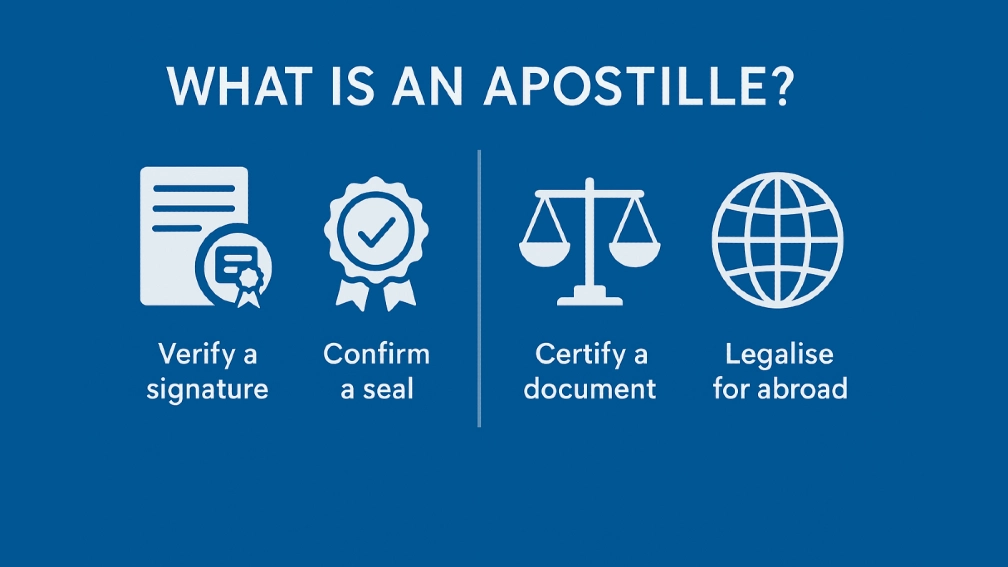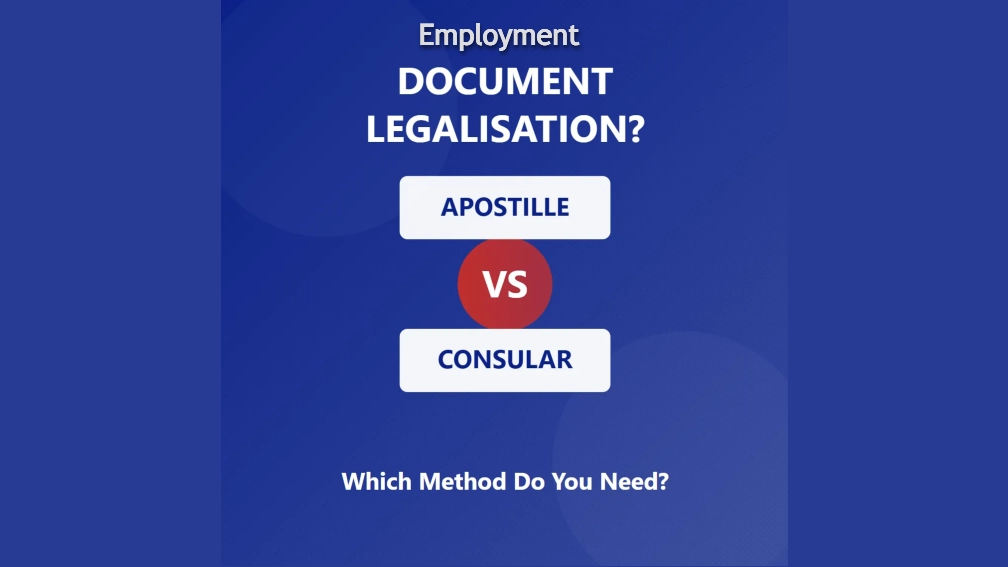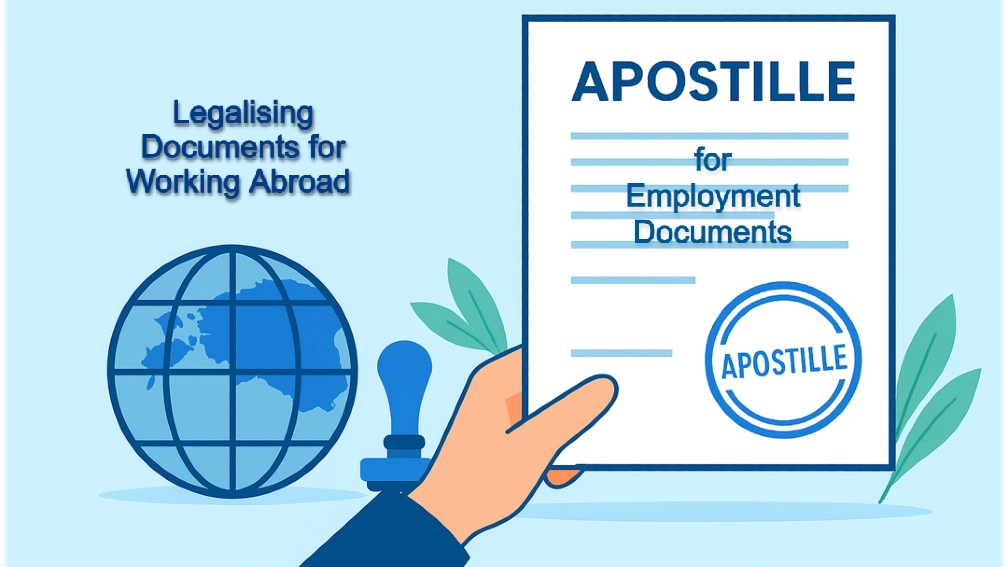Preparing documents for working abroad is an important undertaking. Besides arranging your travel and accepting a role, you must ensure your UK employment documents will be accepted by foreign authorities and companies. A UK document by itself often holds no official weight overseas. This is why legalisation, particularly through an apostille, is essential. Grasping this process reduces the risk of delay or refusal. This article outlines everything you need for successful document legalisation and a trouble-free start abroad.
Why Do Documents for Working Abroad Need Legalisation?
Overseas employers and immigration offices require evidence that your paperwork is authentic. Simply showing a UK document isn’t enough in most countries. Legalisation, such as getting an apostille, proves to authorities that your records are genuine and correctly issued. Without this step, your qualifications and other important details cannot be trusted by officials. Document legalisation gives you a clear link between the UK and your new country, unlocking work visas and job opportunities.
Which Employment Documents Commonly Require an Apostille?
Most people moving abroad for work will be asked for multiple supporting documents, which need legalisation. Being prepared means gathering what’s needed and arranging for a UK apostille certificate if required.
- Job offer letters and employment contracts: A signed letter or contract from an employer is your proof of a valid job offer. For foreign authorities to process your work application, this contract often requires attestation or an apostille. This convinces authorities that both the offer and position exist.
- Academic qualifications (degrees, diplomas, transcripts): Employers and officials frequently ask to verify your education. Apostilling your degree or diploma ensures these are legitimate and UK-issued. Without legalisation, your qualifications might not be accepted, and a job application can be denied.
- Professional licenses and certifications: Certain roles (nursing, law, engineering, and more) demand certified registration. Having your professional qualifications apostilled by your solicitor or notary demonstrates you are fully licensed, with standards recognised in the UK and overseas.
- Police clearance certificates (for immigration & work visas): Usually, a clean criminal record is a key condition for hiring or granting entry. A police certificate, once legalised, confirms this status to employers and immigration officers. The FCDO’s apostille confirms that this document is genuine and fully processed.
- Reference or experience letters: Employers and consulates often ask for formal references from previous jobs. If you have them apostilled, these documents are treated as real and original, which gives reassurance about your history and skills.

5 Step-by-Step Process of Getting an Apostille for Employment Documents
Document legalisation is best approached methodically. Being clear on each stage will help avoid unnecessary trouble.
- Obtain certified copies of documents: The process begins with certified copies prepared by a solicitor or notary. This means they check the document closely and attach a certification stating it is accurate. Certifying is vital for moving ahead in legalisation.
- Notarisation (if required): Some paperwork requires notarisation before further action. This means a notary public confirms your identity and that the document is genuine. Requirements for notarisation vary by document type and country.
- Submit to the competent authority (country-specific): After certification and notarisation, submit your paperwork to the authority that is able to grant a UK apostille certificate. Within the UK, the FCDO processes all applications. Different countries, though, may have other steps or rules, always check carefully.
- Apostille issuance: Once processed, the FCDO or permitted department attaches an apostille to the document. This means it has completed the core document legalisation stage and is ready for use in most countries that recognise apostilles.
- Translation & apostille (if the employer’s country requires it): If you’re working somewhere where English is not the official language, translations might be required. Both original and translated documents may need apostilles. Always check with your new employer or authority about translation and legalisation demands.

Country-Specific Considerations
No two countries have identical requirements. The apostille generally works for Hague Convention members, but other destinations need additional approaches, sometimes called attestation or consular legalisation. Steps might include extra embassy certifications or unique verification letters. Engaging professional legalisation services can help clarify these requirements, reduce confusion, and increase the likelihood of having your documents legalised without error.
Common Mistakes to Avoid When Apostilling Employment Documents
Attention to detail keeps your documents moving through the process without avoidable setbacks.
- Submitting outdated police checks: Many places have strict deadlines, usually accepting police certificates issued only in the last few months. Sending something old might mean rejection. Ask your solicitor or notary about current rules to stay on track.
- Apostilling copies instead of notarised originals: Authorities will not accept plain photocopies; only originals or certified true copies signed by a solicitor or notary. Unauthorised documents cannot pass through the legalisation process. Choose reliable document legalisation services for the best results.
- Forgetting translations: If your papers will be used in a non-English-speaking country, translations by sworn professionals are usually necessary. Both your originals and their translations may need to be apostilled. Checking these rules upfront makes everything faster and smoother.
- Ignoring employer-specific requests: Your new job or the visa office could want particular extras, perhaps a letter from an employer or unique verification. Read every request closely and ask questions so you’re not caught off guard by missing details. Providing every item asked for saves time.
Timeline, Costs, and Processing Considerations
Legalisation is not instant. The FCDO usually requires several working days for standard processing, and any rush order will cost more. Add fees for your solicitor, notary, translations, and couriers. Mistakes or overlooked requirements slow the process further. Getting help from legalisation services can prevent expensive or time-consuming errors and provide peace of mind for your move.
Why Professional Apostille Services Can Save Time and Stress?
Legalising documents can be unexpected and stressful, especially when guidelines differ or demand specific steps. Professional document legalisation services know each step and update, so they handle certification, translation, and apostille correctly. Whether you are dealing with notaries, FCDO staff, or coordinating delivery, having an expert on hand reduces mistakes and lets you focus on job plans.
Contact Us for Ensuring Destination Country Requirements and Professional Guidance
You do not need to handle legalisation by yourself. Our company offers full support in document legalisation, attestation, apostilles, and notary services, designed to meet your destination’s rules. If you are unsure which forms need approval or are struggling with requirements, we are ready to advise and process your documents. We will ensure every document is apostilled and ready for use within your chosen timeframe.
FAQs
Can I start working abroad while my apostille process is still pending?
No, most employers and immigration staff require fully legalised documents before you start work or get a visa. Attempting to begin before approval exposes you and your employer to risk and could create legal issues.
Do digital or scanned employment documents qualify for an apostille?
No, the FCDO and other authorities only issue apostilles for original documents or certified hard copies created by a solicitor or notary. Submit the correct paperwork to avoid unnecessary rejection or delay.
Is notarisation always required before an apostille for employment documents?
Not every document needs notarisation. Some official UK records can go straight for an apostille, but private letters or contracts often must be signed by a solicitor or notary first. When in doubt, ask your legal adviser.
What happens if my employer’s country is not part of the Hague Convention?
If the country does not use apostilles, you will need another form of legalisation, usually attestation at a consulate or embassy. These steps can be more complicated and time-consuming.
Do translations of employment documents need a separate apostille?
Often the answer is yes. Originals should be apostilled first, then the translation (if certified) will receive its own apostille. Using specialist document legalisation services is the quickest way to get both sets accepted.
Can I apostille my employment documents if I’m already abroad?
Yes. Many people submit paperwork for legalisation from outside the UK. You can send the originals to your solicitor, notary, or service provider. They handle FCDO processing and return the legalised documents wherever you need.




